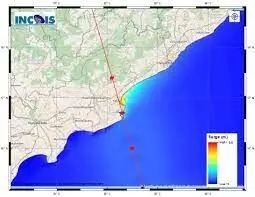Blue economy to natural hazards: INCOIS to host 4th triennial Congress of FIGA in Hyderabad from Nov 6-8
FIGA 2025: INCOIS to host fourth triennial Congress in Hyderabad from Nov 6-8
By Newsmeter Network
Hyderabad: FIGA 2025: INCOIS to host fourth triennial Congress in Hyderabad from Nov 6-8
Hyderabad: Indian National Centre for Ocean Information Services (INCOIS) will host the fourth triennial Congress of the Federation of Indian Geosciences Associations (FIGA 2025) at its Hyderabad campus from November 6-8.
The three-day event will convene geoscientists, oceanographers, fisheries professionals, policymakers, and international experts to explore the evolving role of geosciences in advancing India’s blue economy and coastal resilience.
Congress Theme: Geosciences for Blue Economy
The central theme of this year’s Congress is “Geosciences for Blue Economy - Potential of the Indian Ocean.”
FIGA 2025 will highlight how research and innovation in marine geosciences, fisheries, and ocean monitoring can support sustainable development across the Indian Ocean region.
“By hosting FIGA 2025, INCOIS is not just hosting a Congress; we are hosting a moment to connect science, technology, policy, and practice,” said Dr. Balakrishnan Nair, Director, INCOIS. “Together with our partners, we will look at how the Indian Ocean, its processes, its resources, its hazards, can be better understood and managed for sustainable development.”
About the Guests
Prof. Ajay Kumar Sood, Principal Scientific Adviser to the Government of India, will attend the Congress as the Chief Guest, while Dr. M. Ravichandran, Secretary, Ministry of Earth Sciences (MoES), will be the Guest of Honour.
The Congress will feature plenary keynote talks, technical sessions, poster presentations, a Young Scientist Conclave, and outreach activities aimed at engaging students and the general public in ocean sciences.
What is FIGA?
The Federation of Indian Geosciences Associations (FIGA) is an interdisciplinary forum that connects Earth and marine science associations across India. It was established to promote collaboration among disciplines such as oceanography, geophysics, hydrology, fisheries, and resource management.
By bringing together experts from these fields, FIGA provides a platform to share knowledge, build partnerships, and address scientific and societal challenges linked to India’s land and ocean systems.
Congress Focus Areas
INCOIS will align its participation with the four key thematic areas of FIGA 2025:
• Coastal and Ocean Processes: Studies on coastline change, sediment transport, ocean circulation, marine geodynamics, and climate impacts such as sea-level rise and marine heatwaves.
• Coastal and Ocean Resources: Exploration of mineral and biological resources, including fisheries, mangroves, marine-derived bioactives, and renewable energy resources like wave, tidal, and wind energy.
• Natural Hazards: Research on earthquakes, tsunamis, landslides, cyclones, and storm surges, along with the use of satellite-based observation systems for hazard monitoring.
• Recent Advances and Emerging Trends: Applications of AI and machine learning, new ocean observation technologies, and data-driven early warning systems.
INCOIS and the Blue Economy
As India’s premier operational ocean information institution under the Ministry of Earth Sciences, INCOIS provides services related to ocean state forecasting, fisheries advisories, and early warning systems for hazards such as tsunamis and storm surges.
Hosting FIGA 2025, officials said, will allow INCOIS to showcase its core competencies and demonstrate how ocean science, data, and policy can converge to strengthen the blue economy, a framework that promotes the sustainable use of ocean resources for economic growth and improved livelihoods.
Engaging the Next Generation
The Congress will also include a Young Scientist Conclave and a Popularisation of Ocean Sciences programme for school students, aimed at encouraging young minds to pursue careers in ocean and Earth sciences.
“Through these engagements, INCOIS and FIGA 2025 hope to create a broader understanding of the ocean’s role in India’s environmental stability and economic future, while advancing regional cooperation in marine research and disaster resilience,” said Dr. Nair.